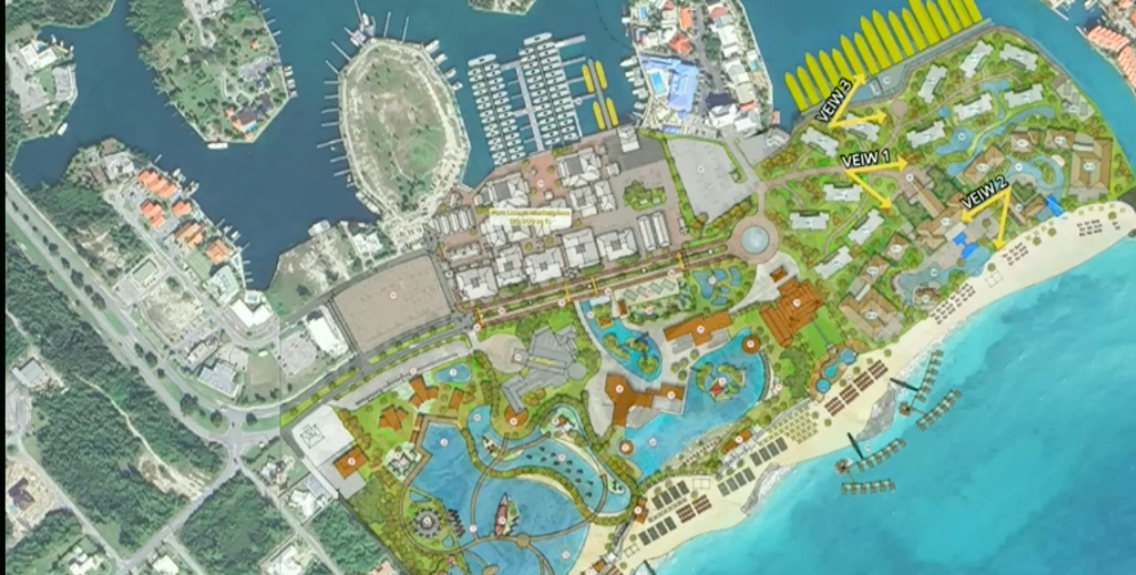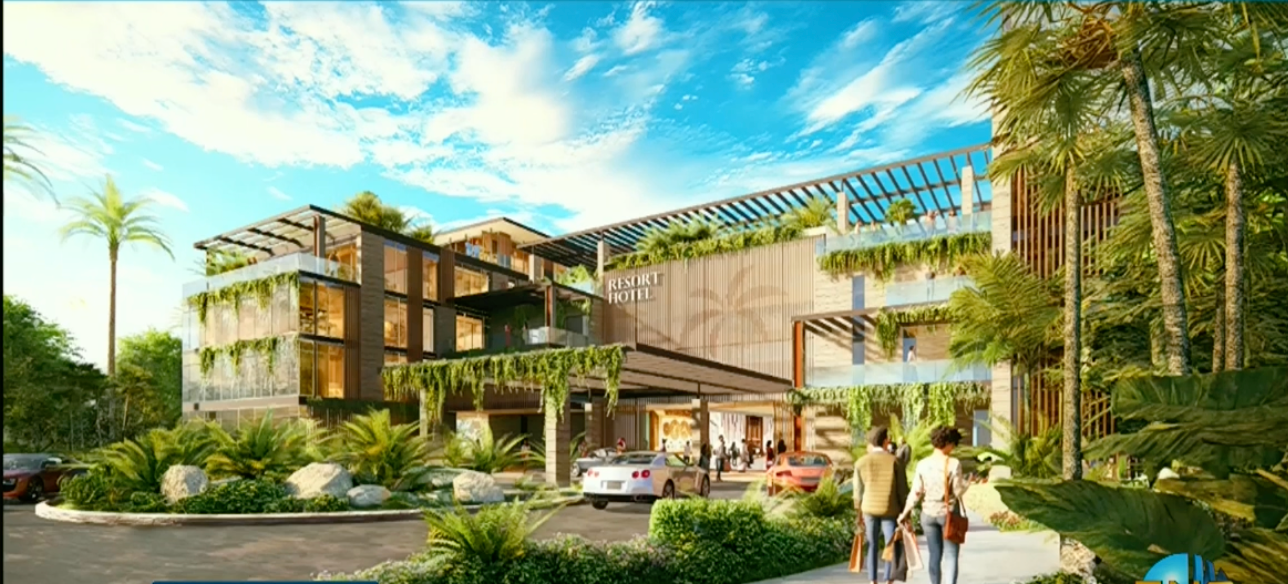NASSAU, BAHAMAS – The long-awaited redevelopment of the Grand Lucayan Resort took a major step forward on Thursday, as Concord Wilshire Capital signed a Heads of Agreement with the Government of The Bahamas for an $827 million investment in the iconic Freeport property.
The deal, officials say, could reshape the economic landscape of Grand Bahama and help reestablish the island as a competitive player in tourism. The redevelopment, to be rolled out in phases, is expected to create more than 3,000 jobs—1,320 during construction and another 1,750 permanent positions once the resort is fully operational. The hotel component alone will support over 450 jobs, with additional employment generated by the casino, timeshare residences, marina, cruise port, and associated service industries.
 Nate Sirang, president of Concord Wilshire, called the signing a pivotal moment and said the project—under the company’s Bahamian subsidiary Ancient Waters Bahamas Ltd.—aims to build a “powerful economic resort engine” with wide-reaching benefits for the island. Sirang, who has Bahamian family ties, described the plan as a long-term commitment to Grand Bahama and to “bringing Bahamians back home.”
Nate Sirang, president of Concord Wilshire, called the signing a pivotal moment and said the project—under the company’s Bahamian subsidiary Ancient Waters Bahamas Ltd.—aims to build a “powerful economic resort engine” with wide-reaching benefits for the island. Sirang, who has Bahamian family ties, described the plan as a long-term commitment to Grand Bahama and to “bringing Bahamians back home.”
The project has been pitched as a complete reimagining of the Grand Lucayan into a modern, integrated resort village. It will include a new 350-room hotel, an indoor-outdoor casino, a 120-unit timeshare complex, a redesigned Greg Norman golf course, a mega yacht marina, and a dedicated cruise resort experience intended to attract major international cruise lines.
Sirang emphasized that the project is not a speculative venture but a carefully structured, fully capitalized initiative backed by experienced international development partners. He added that Bahamian contractors, professionals, and businesses will be integrated throughout the buildout, and that job guarantees and training initiatives will be central to the execution strategy.

The redevelopment follows several failed attempts over the past decade to breathe new life into the Grand Lucayan, which was battered by Hurricane Matthew in 2016 and further weakened by the pandemic. The Government of The Bahamas purchased the resort in 2018 for $65 million, and efforts to privatize and redevelop the site have faced numerous setbacks since then. The hurricane-damaged resort was purchased by the government in 2018 for $65 million, but previous sale attempts had faltered. In 2021, the Davis administration canceled a proposed deal with Royal Caribbean and the ITM Group, calling it not in the best interest of Bahamians. A subsequent $100 million agreement with Electra America, announced in 2022, also collapsed. This time, officials say, the investment is real, and the clock has started.
Prime Minister Philip Davis said the deal represents a long-anticipated breakthrough and signals the government’s determination to revitalize Grand Bahama’s tourism product. He reflected on the moment’s significance, saying:
“Some chapters take longer to write than we’d like — but sometimes it is those same chapters which turn out to be crucial to the story. Today, I believe we will long be remembered as pivotal for the people of Grand Bahama. It’s time to turn the page on hardship, to leave heartbreak behind. It’s a time for renewal, a time for new opportunities, a time for new beginnings.”

Highlighting the economic impact of the project, the Prime Minister outlined the scale of the redevelopment: “At the heart of this redevelopment is an integrated resort village that will create jobs, restore confidence, and give Grand Bahama the momentum it deserves. That means three new hotel buildings. A full-scale cruise resort. A revitalized 25,000-square-foot casino. A Greg Norman-designed golf course. Over-the-water cabanas, beach clubs, family attractions, water parks, retail spaces, restaurants, music venues — and a 16-slip mega-yacht marina.”
He noted the scale of investment and job creation: “This is an $827 million investment and perhaps more—the kind of scale that has the power to shift the local economy, create opportunity at every level, and change lives for the better. More than 1,300 jobs will be created during construction, and 1,750 permanent jobs when the development is fully up and running. Thousands of Bahamians will have an opportunity to earn, to grow, and to build a future for themselves and their families, right here at home.”
Prime Minister Davis underscored the government’s commitment to putting Bahamians first: “We’ve said clearly: Bahamians must be at the centre of this. At least 80 percent of these jobs must go to our people. That’s not just a condition—it’s a conviction. Because we know the skill is here. The talent is here. The work ethic is here. What’s been missing is opportunity. But no longer.”
He went on to situate the project within a broader vision for Grand Bahama’s future: “What we’re building here at the Grand Lucayan is not a stand-alone project — it’s part of a wider, more connected vision for Grand Bahama. A vision that recognises that true development doesn’t happen in silos. It happens when the key pieces fit together — when infrastructure supports industry, when tourism supports small business development, when investment supports people’s ability to live, and work, and thrive – right here at home.”
The Prime Minister highlighted ongoing initiatives alongside the redevelopment: “We are moving ahead with a new, modern airport that matches the scale of Grand Bahama’s ambitions… We’re also supporting the Carnival port development — a critical piece in making Grand Bahama a leading cruise destination again… The shipyard, too, is part of this strategy… And don’t forget – we are building a new hospital, because the people of this island deserve modern, reliable healthcare… We are investing in roads and water systems. We are helping small businesses. We are pushing for more training, more job readiness, and more chances for young people to stay and succeed right here.”
Minister for Grand Bahama Ginger Moxey described the project as “transformational,” adding that it reflects the Davis administration’s strategy of prioritizing large-scale, job-creating investments for the island.
Under the terms of the agreement, Bahamian employment must account for at least 80 percent of the workforce. Additionally, a compensation and job recall plan has been implemented for current Grand Lucayan employees, many of whom have remained with the property throughout its years of uncertainty.
The development will also tie into the existing Port Lucaya Marketplace and the nearby marina district, which officials see as critical to enhancing visitor experience and length of stay. While international cruise and entertainment operators are expected to participate in the resort’s operations, project executives have stressed that local culture, cuisine, and entertainment will remain central to the guest offering.
Construction is expected to begin within 90 days of receiving final regulatory approvals, with early works focused on site preparation and demolition. The entire buildout is expected to take several years, though officials anticipate meaningful economic activity and hiring within the first year.






